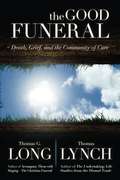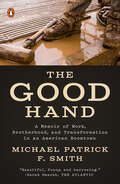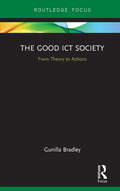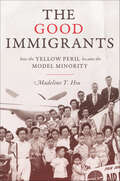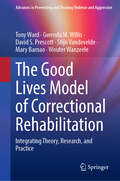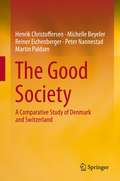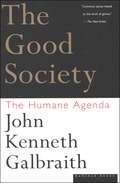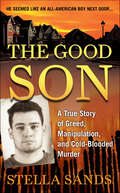- Table View
- List View
The Good Funeral
by Thomas Lynch Thomas G. LongTwo of the most authoritative voices on the funeral industry come together here in one volume to discuss the current state of the funeral. Through their different lenses--one as a preacher and one as a funeral director--Thomas G. Long and Thomas Lynch alternately discuss several challenges facing "the good funeral," including the commercial aspects that have led many to be suspicious of funeral directors, the sometimes tense relationship between pastors and funeral directors, the tendency of modern funerals to exclude the body from the service, and the rapid growth in cremation. The book features forewords from Patrick Lynch, President of the National Funeral Directors Association, and Barbara Brown Taylor, highly praised author and preacher. It is an essential resource for funeral directors, morticians, and pastors, and anyone else interested in current funeral practices.
The Good Girls: An Ordinary Killing
by Sonia FaleiroA shattering, utterly immersive work of investigative journalism, The Good Girls slips behind political maneuvering, caste systems and codes of honour in a village in northern India to tell the real story behind the tragic deaths of two teenage girls and an epidemic of violence against women.In the early dawn one day in 2014, a man discovered the dead bodies of 14-year-old Lalli Shakya and 16-year-old Padma Shakya hanging from a mango tree on the edge of their village in Uttar Pradesh. When the inseparable cousins hadn't returned from a walk to the fields to relieve themselves the evening before, their families had begun searching for them. Upon hearing of the discovery and reaching the bodies, the grief-stricken women of the family formed a protective shield around the tree. They knew that if their girls were taken down immediately, they would be forgotten, lost in a brutally inefficient and prejudiced system; but if media arrived, and photos of the bodies went viral, those in power could not ignore the deaths and justice would be served. Dramatic images of the Shakya girls spread across India and the world, inciting horror and despair. Padma and Lalli died two years after the Delhi bus rape, and many saw the cousins as victims of an ongoing epidemic of violence, one that was emerging in rural villages. The reality that Sonia Faleiro deftly illuminates,wrapped in pressures of caste, gender, technology and teenage desire, proves to be more complicated, and just as devastating. Intimate, mesmerizing, based on years of meticulous reportage, The Good Girls uncovers the heartbreaking truth of what happened that night through the voices of the girls' families, those who saw them last and the legal and medical officials who touched the case.
The Good Glow: Charity and the Symbolic Power of Doing Good
by Jon DeanWe praise those people who do things for others. But the symbolic power of giving means individuals can take advantage of the glow of 'goodness' that charity provides. This book analyses the reality of how charity operates in the social world; how the personal benefits of giving and volunteering are vital for getting charitable acts to happen; how the altruism associated with gifts isn't always what it seems; how charity misbehaviour or bad management gets overlooked; and how charity symbols are weaponised against those who don't participate. Drawing on original data and a novel application of the sociology of Bourdieu, this book examines a wide range of examples from culture, politics and society to provide an entertaining critique of how contemporary charity works.
The Good Hand: A Memoir of Work, Brotherhood, and Transformation in an American Boomtown
by Michael Patrick Smith"Remarkable . . . this is the book that Hillbilly Elegy should have been." --Kirkus ReviewsA vivid window into the world of working class men set during the Bakken fracking boom in North DakotaLike thousands of restless men left unmoored in the wake of the 2008 economic crash, Michael Patrick Smith arrived in the fracking boomtown of Williston, North Dakota five years later homeless, unemployed, and desperate for a job. Renting a mattress on a dirty flophouse floor, he slept boot to beard with migrant men who came from all across America and as far away as Jamaica, Africa and the Philippines. They ate together, drank together, argued like crows and searched for jobs they couldn't get back home. Smith's goal was to find the hardest work he could do--to find out if he could do it. He hired on in the oil patch where he toiled fourteen hour shifts from summer's 100 degree dog days to deep into winter's bracing whiteouts, all the while wrestling with the demons of a turbulent past, his broken relationships with women, and the haunted memories of a family riven by violence.The Good Hand is a saga of fear, danger, exhaustion, suffering, loneliness, and grit that explores the struggles of America's marginalized boomtown workers--the rough-hewn, castoff, seemingly disposable men who do an indispensable job that few would exalt: oil field hands who, in the age of climate change, put the gas in our tanks and the food in our homes. Smith, who had pursued theater and played guitar in New York, observes this world with a critical eye; yet he comes to love his coworkers, forming close bonds with Huck, a goofy giant of a young man whose lead foot and quick fists get him into trouble with the law, and The Wildebeest, a foul-mouthed, dip-spitting truck driver who torments him but also trains him up, and helps Smith "make a hand."The Good Hand is ultimately a book about transformation--a classic American story of one man's attempt to burn himself clean through hard work, to reconcile himself to himself, to find community, and to become whole.
The Good Holiday: Development, Tourism and the Politics of Benevolence in Mozambique
by João Afonso BaptistaDrawing on ethnographic research in the village of Canhane, which is host to the first community tourism project in Mozambique, The Good Holiday explores the confluence of two powerful industries: tourism and development, and explains when, how and why tourism becomes development and development, tourism. The volume further explores the social and material consequences of this merging, presenting the confluence of tourism and development as a major vehicle for the exercise of ethics, and non-state governance in contemporary life.
The Good ICT Society: From Theory to Actions (Routledge Research in Information Technology and Society)
by Gunilla BradleyWhat is Quality of Life in a society that has embraced information and communication technology (ICT)? What is Wisdom in this kind of society? And what things are helping or hindering us from having both wisdom and a good quality of life in ICT societies? #65533; Taking the reader through a quick analysis of the current social and psychological changes in the Information and Communication Society, Bradley challenges us to avoid becoming victims of technology - whether we are professionals, policymakers, parents or citizens. Indeed, she introduces a theoretical model based on four decades#65533; worth of research to help the reader to understand this complex, technological world. In addition to focusing the reader#65533;s attention on convergence and acceleration, this model describes the interplay between technology, societal structure, organizational design and human roles, thus leading to what Bradley describes as a "good ICT society". #65533; Emphasising the necessity of a co-operative parallel between the automation and humanization of society, this innovative volume will be of interest to undergraduate and postgraduate students and postdoctoral researchers interested in the subjects such as Information and Communication Technology and Social Change, Psychology and Sociology, Computer Technology and Media Technology.
The Good Immigrant USA: 26 Writers Reflect on America
by Nikesh Shukla Chimene SuleymanGUARDIAN MUST READ BOOKS OF 2019 'The you-gotta-read-this anthology' Stylist'This collection showcases the joy, empathy and fierceness needed to adopt the country as one's own' Publishers Weekly An urgent collection of essays by first- and second-generation immigrants, exploring what it's like to be othered in an increasingly divided America. From Trump's proposed border wall and travel ban to the marching of White Supremacists in Charlottesville, America is consumed by tensions over immigration and the question of which bodies are welcome. In this much-anticipated follow-up to the bestselling UK edition, hailed by Zadie Smith as 'lively and vital', editors Nikesh Shukla and Chimene Suleyman hand the microphone to an incredible range of writers whose humanity and right to be in the US is under attack. Chigozie Obioma unpacks an Igbo proverb that helped him navigate his journey to America from Nigeria. Jenny Zhang analyzes cultural appropriation in nineties fashion, recalling her own pain and confusion as a teenager trying to fit in. Fatimah Asghar describes the flood of memory and emotion triggered by an encounter with an Uber driver from Kashmir. Alexander Chee writes of a visit to Korea that changed his relationship to his heritage. These writers, and the many others in this singular collection, share powerful personal stories of living between cultures and languages while struggling to figure out who they are and where they belong. By turns heartbreaking and hilarious, troubling and uplifting, the essays in The Good Immigrant USA come together to create a provocative, conversation-sparking, multi-vocal portrait of America now.Essays from:Porochista Khakpour; Nicole Dennis-Benn; Rahawa Haile; Teju Cole; Priya Minhas; Walé Oyéjidé; Fatimah Asghar; Tejal Rao; Maeve Higgins; Krutika Mallikarjuna; Jim St. Germain; Jenny Zhang; Chigozie Obioma; Alexander Chee; Yann Demange; Jean Hannah Edelstein; Chimene Suleyman; Basim Usmani; Daniel José Older; Adrián Villar Rojas; Sebastián Villar Rojas; Dani Fernandez; Fatima Farheen Mirza; Susanne Ramírez de Arellano; Mona Chalabi; Jade Chang
The Good Immigrant USA: 26 Writers on America, Immigration and Home
by Nikesh Shukla Chimene SuleymanGUARDIAN MUST READ BOOKS OF 2019 'The you-gotta-read-this anthology' Stylist'This collection showcases the joy, empathy and fierceness needed to adopt the country as one's own' Publishers Weekly An urgent collection of essays exploring what it's like to be othered in an increasingly divided America. From Trump's proposed border wall and travel ban to the marching of White Supremacists in Charlottesville, America is consumed by tensions over immigration and the question of which bodies are welcome. In this much-anticipated follow-up to the bestselling UK edition, hailed by Zadie Smith as 'lively and vital', editors Nikesh Shukla and Chimene Suleyman hand the microphone to an incredible range of writers whose humanity and right to be in the US is under attack. By turns heartbreaking and hilarious, troubling and uplifting, the essays in The Good Immigrant USA come together to create a provocative, conversation-sparking, multi-vocal portrait of America now.Essays from:Porochista Khakpour; Nicole Dennis-Benn; Rahawa Haile; Teju Cole; Priya Minhas; Walé Oyéjidé; Fatimah Asghar; Tejal Rao; Maeve Higgins; Krutika Mallikarjuna; Jim St. Germain; Jenny Zhang; Chigozie Obioma; Alexander Chee; Yann Demange; Jean Hannah Edelstein; Chimene Suleyman; Basim Usmani; Daniel José Older; Adrián Villar Rojas; Sebastián Villar Rojas; Dani Fernandez; Fatima Farheen Mirza; Susanne Ramírez de Arellano; Mona Chalabi; Jade Chang
The Good Immigrants: How the Yellow Peril Became the Model Minority (Politics and Society in Modern America)
by Madeline Y. HsuConventionally, US immigration history has been understood through the lens of restriction and those who have been barred from getting in. In contrast, The Good Immigrants considers immigration from the perspective of Chinese elites—intellectuals, businessmen, and students—who gained entrance because of immigration exemptions. Exploring a century of Chinese migrations, Madeline Hsu looks at how the model minority characteristics of many Asian Americans resulted from US policies that screened for those with the highest credentials in the most employable fields, enhancing American economic competitiveness.The earliest US immigration restrictions targeted Chinese people but exempted students as well as individuals who might extend America's influence in China. Western-educated Chinese such as Madame Chiang Kai-shek became symbols of the US impact on China, even as they patriotically advocated for China's modernization. World War II and the rise of communism transformed Chinese students abroad into refugees, and the Cold War magnified the importance of their talent and training. As a result, Congress legislated piecemeal legal measures to enable Chinese of good standing with professional skills to become citizens. Pressures mounted to reform American discriminatory immigration laws, culminating with the 1965 Immigration Act.Filled with narratives featuring such renowned Chinese immigrants as I. M. Pei, The Good Immigrants examines the shifts in immigration laws and perceptions of cultural traits that enabled Asians to remain in the United States as exemplary, productive Americans.
The Good Life
by Loren BaritzWhat is the American middle class? What does it want? In search of these answers The Good Life tackles the assumptions Americans make and have made about their own culture--about the meaning of equality, success, personal and national security, acceptable ways of dressing and loving and raising children, and, most important, individual freedom. Loren Baritz, a noted observer of American society, leads us to discover not only what Americans are after, but what they usually get in the end. Revealing the realities, the illusions, and the myths of the American middle class, The Good Life makes an exceptional contribution to the understanding of the American way of life. Its broad, incisive, scholarly commentary is sure to arouse controversy and debate.
The Good Life in a Technological Age (Routledge Studies in Science, Technology and Society)
by Adam Briggle Philip Brey Edward SpenceModern technology has changed the way we live, work, play, communicate, fight, love, and die. Yet few works have systematically explored these changes in light of their implications for individual and social welfare. How can we conceptualize and evaluate the influence of technology on human well-being? Bringing together scholars from a cross-section of disciplines, this volume combines an empirical investigation of technology and its social, psychological, and political effects, and a philosophical analysis and evaluation of the implications of such effects.
The Good Life: 30 Steps to Perfecting the Art of Living
by Mark VernonHappiness. We all want it - but how can we get it? Author Mark Vernon has solved the problem by collecting the wisdom of the greatest minds in history and making their thinking on the things that matter most in life accessible and, above all, practical. Full of everday examples to make sometimes high-blown philosophy entertaining and relevant, this book shows you in just 30 steps how you can crack the secret to living The Good Life.
The Good Life: 30 Steps to Perfecting the Art of Living
by Mark VernonHappiness. We all want it - but how can we get it? Author Mark Vernon has solved the problem by collecting the wisdom of the greatest minds in history and making their thinking on the things that matter most in life accessible and, above all, practical. Full of everday examples to make sometimes high-blown philosophy entertaining and relevant, this book shows you in just 30 steps how you can crack the secret to living The Good Life.
The Good Life: Aspiration, Dignity, and the Anthropology of Wellbeing
by Edward F. FischerWhat could middle-class German supermarket shoppers buying eggs and impoverished coffee farmers in Guatemala possibly have in common? Both groups use the market in pursuit of the "good life. " But what exactly is the good life? How do we define wellbeing beyond material standards of living? While we all may want to live the good life, we differ widely on just what that entails. In "The Good Life," Edward Fischer examines wellbeing in very different cultural contexts to uncover shared notions of the good life and how best to achieve it. With fascinating on-the-ground narratives of Germans' choices regarding the purchase of eggs and cars, and Guatemalans' trade in coffee and cocaine, Fischer presents a richly layered understanding of how aspiration, opportunity, dignity, and purpose comprise the good life.
The Good Lives Model of Correctional Rehabilitation: Integrating Theory, Research, and Practice (Advances in Preventing and Treating Violence and Aggression)
by Tony Ward David S. Prescott Gwenda M. Willis Stijn Vandevelde Mary Barnao Wouter WanzeeleThe book examines the Good Lives Model (GLM) of correctional rehabilitation and its dual aims of risk reduction and well-being enhancement for individuals who have committed crimes. It describes the use of individuals’ prioritized values in intervention plans and to capitalize on and further develop their strengths and reduce the risk for future offending. The book directly addresses the differences between purely risk-oriented rehabilitation correctional models (e.g., Risk-Need-Responsivity Model) and strength-based approaches (e.g., GLM) and the clinical advantages of using the latter. It updates the GLM in the context of recent work in evolutionary biology, quality of life and well-being, cognitive neuroscience, developmental psychology, human rights, naturalistic ethics, criminology, desistance research, and theoretical reformulations of dynamic risk and protective factors. Case studies illustrate the detailed application of GLM evidence-based practice plans to adults convicted of crimes and demonstrate the effectiveness of GLM intervention strategies. Key areas of coverage include: GLM community and within-prison intervention strategies. Incorporating dynamic risk factors into GLM case formulations. Incorporating desistance research in postrelease planning and practice. Policy implications of the GLM. The Good Lives Model of Correctional Rehabilitation is a must-have resource for clinicians, therapists, and other professionals as well as researchers, professors, and graduate students in developmental psychology, family studies, forensic psychology, criminology/criminal justice, public health, psychotherapy/counseling, psychiatry, social work, educational policy and politics, health psychology, nursing, and behavioral therapy/rehabilitation.
The Good Luck Book: A Celebration of Global Traditions, Superstitions, and Folklore
by Heather AlexanderEver wondered why we knock on wood, cross our fingers, or say &“white rabbits&” on the first day of the month? Dive in and learn about fascinating traditions and superstitions from all over the world!The Good Luck Book explores the surprising - and sometimes scary - history of the world&’s most practiced traditions and superstitions (and plenty more that you probably won&’t have heard of!). Discover superstitions old and new from China to Chile, the USA to the Ukraine. Learn how and why they started, and why people still participate in them today. Featuring fascinating topics, including animals, nature, sport, life events, the human body, and lucky locations, The Good Luck Book is packed with bold original illustrations, fun facts, and the origin stories behind rituals and superstitions. Ideal for young readers curious about world culture and why we do the things we do, this colorful and charming book will amaze and entertain.
The Good Mother Myth: Redefining Motherhood to Fit Reality
by Avital Norman Nathman Christy Turlington BurnsIn an era of mommy blogs, Pinterest, and Facebook, The Good Mother Myth dismantles the social media-fed notion of what it means to be a "good mother." This collection of essays takes a realistic look at motherhood and provides a platform for real voices and raw stories, each adding to the narrative of motherhood we don't tend to see in the headlines or on the news.From tales of mind-bending, panic-inducing overwhelm to a reflection on using weed instead of wine to deal with the terrible twos, the honesty of the essays creates a community of mothers who refuse to feel like they're in competition with others, or with the notion of the ideal mom-they're just trying to find a way to make it work. With a foreword by Christy Turlington Burns and a contributor list that includes Jessica Valenti, Sharon Lerner, Soraya Chemaly, Amber Dusick, and many more, this remarkable collection seeks to debunk the myth and offer honest perspectives on what it means to be a mother.
The Good Prison Officer: Inside Perspectives
by Andi BrierleyThis book offers a solution-focused and strengths-based guide to becoming an effective Prison Officer. Written and developed by a collection of ex-prisoners who are all now professionals, practitioners, and educators in the criminal justice field, the book draws on lived experience and the diverse literature on prisons and penal policy to explore good and bad examples of professional practice. The book is informed by the belief that those with direct experiences of custody and incarceration offer a vital perspective on the efficacy of penal practice. While these voices are often accessed through research, it is rare they are seeking to lead the conversation. This book seeks to reset this balance. Drawing on themes such as discretion, respect, relationships, and legitimacy, it offers recommendations for best practices in developing a rehabilitative culture in prison. This book will be of interest to practitioners, researchers, and educators alike. It is essential reading for all those engaged with prisons, punishment, penal practice, desistance, and rehabilitation.
The Good Rich and What They Cost Us
by Robert F. Dalzell Jr.This timely book holds up for scrutiny a great paradox at the core of the American Dream: a passionate belief in the principle of democracy combined with an equally passionate celebration of the creation of wealth. Americans treasure an open, equal society, yet we also admire those fortunate few who amass riches on a scale that undermines social equality. In today's era of "vulture capitalist" hedge fund managers, internet fortunes, and a growing concern over inequality in American life, should we cling to both parts of the paradox? Can we? To understand the problems that vast individual fortunes pose for democratic values, Robert Dalzell turns to American history. He presents an intriguing cast of wealthy individuals from colonial times to the present, including George Washington, one of the richest Americans of his day, the "robber baron" John D. Rockefeller, and Oprah Winfrey, for whom extreme wealth is inextricably tied to social concerns. Dalzell uncovers the sources of contradictory attitudes toward the rich, how the very rich have sought to be perceived as "good rich," and the facts behind the widespread notion that wealth and generosity go hand in hand. In a thoughtful and balanced conclusion, the author explores the cost of our longstanding attitudes toward the rich. Among the case studies in America's Good Rich:Puritan merchant Robert KeayneGeorge WashingtonManufacturers Amos & Abbot LawrenceOil magnate John D. RockefellerBill GatesWarren BuffetSteve JobsOprah Winfrey
The Good Society
by Henrik Christoffersen Michelle Beyeler Reiner Eichenberger Peter Nannestad Martin PaldamDenmark and Switzerland are small and successful countries with exceptionally content populations. However, they have very different political institutions and economic models. They have followed the general tendency in the West toward economic convergence, but both countries have managed to stay on top. They both have a strong liberal tradition, but otherwise their economic strategies are a welfare state model for Denmark and a safe haven model for Switzerland. The Danish welfare state is tax-based, while the expenditures for social welfare are insurance-based in Switzerland. The political institutions are a multiparty unicameral system in Denmark, and a permanent coalition system with many referenda and strong local government in Switzerland. Both approaches have managed to ensure smoothly working political power-sharing and economic systems that allocate resources in a fairly efficient way. To date, they have also managed to adapt the economies to changes in the external environment with a combination of stability and flexibility.
The Good Society: The Human Agenda (Las Letras De Drakontos Ser.)
by John Kenneth GalbraithThe legendary economist explains how a nation can remain both compassionate and fiscally sound, with &“common sense raised to the level of genius&” (The New Yorker). This compact, eloquent book offers a blueprint for a workable national agenda that allows for human weakness without compromising a humane culture. Arguing that it is in the best interest of the United States to avoid excessive wealth and income inequality, and to safeguard the well-being of its citizens, he explores how the goal of a good society can be achieved in an economically feasible way. Touching on topics from regulation, inflation, and deficits to education, the environment, bureaucracy, and the military, Galbraith avoids purely partisan or rigid ideological politics—instead addressing practical problems with logic and well-thought-out principles. &“Carefully reasoned . . . the pragmatically liberal Galbraith [argues] that both socialism and complete surrender to market forces are irrelevant as guides to public action.&” —Publishers Weekly
The Good Son: A True Story of Greed, Manipulation, and Cold-Blooded Murder
by Stella SandsHis parents gave him everything he ever wanted. He paid them back—with murder. The true crime case of conspiracy killer Andrew Wamsley.Rick and Suzanna Wamsley were well-loved in their Mansfield, Texas, community. Former high-school sweethearts, they provided their two children with every comfort. But their twenty-year-old son, Andrew, had a bitter, rebellious streak . . . and resented his parents for making him go to college, for not giving him the title to the sports car he wanted, and for their disapproval of his teenage girlfriend, Chelsea Richardson. She was from the other side of the tracks—and she had a deadly plan in store for the Wamsleys . . . On the night of December 11, 2003, Chelsea and two accomplices entered the Wamsley home. Carrying guns and knives, they killed Suzanna instantly. Rick fought his attackers tooth and nail . . . but couldn’t save himself. Later, DNA evidence would link Chelsea’s best friend, Susana Toledano, to the crime scene. Then authorities learned that a fourth suspect provided the murder weapon. It was only a matter of time before investigators closed in on the last perpetrator—the one person who stood to inherit almost two million dollars in the event of the Wamsleys’ deaths: Andrew, The Good Son.
The Good Spy: The Life and Death of Robert Ames
by Kai BirdThe Good Spy is Pulitzer Prize-winning biographer Kai Bird's compelling portrait of the remarkable life and death of one of the most important operatives in CIA history - a man who, had he lived, might have helped heal the rift between Arabs and the West. On April 18, 1983, a bomb exploded outside the American Embassy in Beirut, killing 63 people. The attack was a geopolitical turning point. It marked the beginning of Hezbollah as a political force, but even more important, it eliminated America's most influential and effective intelligence officer in the Middle East - CIA operative Robert Ames. What set Ames apart from his peers was his extraordinary ability to form deep, meaningful connections with key Arab intelligence figures. Some operatives relied on threats and subterfuge, but Ames worked by building friendships and emphasizing shared values - never more notably than with Yasir Arafat's charismatic intelligence chief and heir apparent Ali Hassan Salameh (aka "The Red Prince"). Ames' deepening relationship with Salameh held the potential for a lasting peace. Within a few years, though, both men were killed by assassins, and America's relations with the Arab world began heading down a path that culminated in 9/11, the War on Terror, and the current fog of mistrust. Bird, who as a child lived in the Beirut Embassy and knew Ames as a neighbor when he was twelve years old, spent years researching The Good Spy. Not only does the book draw on hours of interviews with Ames' widow, and quotes from hundreds of Ames' private letters, it's woven from interviews with scores of current and former American, Israeli, and Palestinian intelligence officers as well as other players in the Middle East "Great Game." What emerges is a masterpiece-level narrative of the making of a CIA officer, a uniquely insightful history of twentieth-century conflict in the Middle East, and an absorbing hour-by-hour account of the Beirut Embassy bombing. Even more impressive, Bird draws on his reporter's skills to deliver a full dossier on the bombers and expose the shocking truth of where the attack's mastermind resides today.
The Good Women of China
by XinranAn unprecedented, intimate account of the lives of modern Chinese women, told by the women themselves -- true stories of the political and personal upheavals they have endured in their chaotic and repressive society. For eight groundbreaking years, Xinran hosted a radio program in China during which she invited women to call in and talk about themselves. Broadcast every evening, Words on the Night Breeze became famous throughout the country for its unflinching portrayal of what it meant to be a woman in modern China. Centuries of obedience to their fathers, husbands and sons, followed by years of fear under Communism, had made women terrified of talking openly about their feelings. Xinran won their trust and, through her compassion and ability to listen, became the first woman to hear their true stories.This unforgettable book is the story of how Xinran negotiated the minefield of restrictions imposed on Chinese journalists to reach out to women across the country. Through the vivid intimacy of her writing, these women confide in the reader, sharing their deepest secrets. Whether they are the privileged wives of party leaders or peasants in a forgotten corner of the countryside, they tell of almost inconceivable suffering: forced marriages, sexual abuse, separation of parents from their children, extreme poverty. But they also talk about love -- about how, despite cruelty, despite politics, the urge to nurture and cherish remains. Their stories changed Xinran's understanding of China forever. Her book will reveal the lives of Chinese women to the West as never before.
The Good Women of China
by XinranWhen Deng Xiaoping's efforts to "open up" China took root in the late 1980s, Xinran recognized an invaluable opportunity. As an employee for the state radio system, she had long wanted to help improve the lives of Chinese women. But when she was given clearance to host a radio call-in show, she barely anticipated the enthusiasm it would quickly generate. Operating within the constraints imposed by government censors, "Words on the Night Breeze" sparked a tremendous outpouring, and the hours of tape on her answering machines were soon filled every night. Whether angry or muted, posing questions or simply relating experiences, these anonymous women bore witness to decades of civil strife, and of halting attempts at self-understanding in a painfully restrictive society. In this collection, by turns heartrending and inspiring, Xinran brings us the stories that affected her most, and offers a graphically detailed, altogether unprecedented work of oral history.From the Trade Paperback edition.
